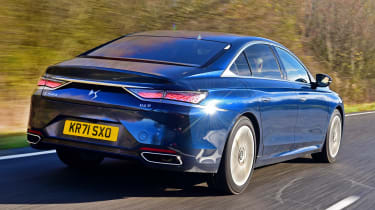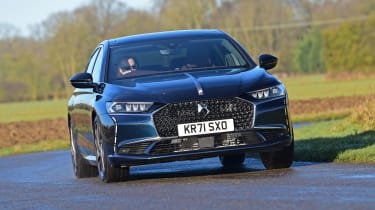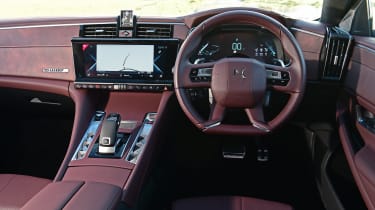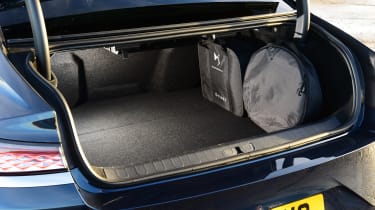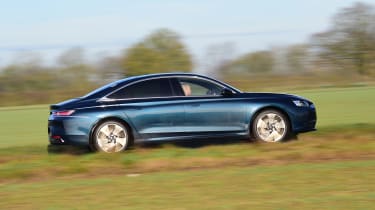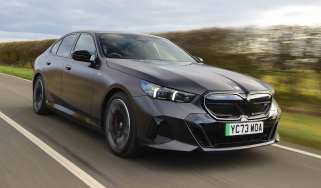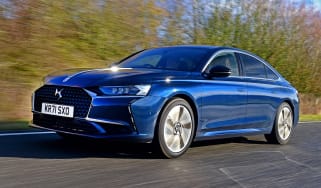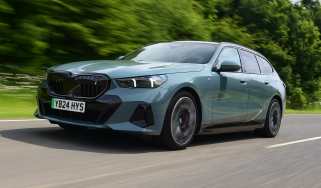DS 9 review
DS 9 is a stylish and offbeat executive saloon, but can’t beat upmarket rivals for driving dynamics, tech or image

Is the DS 9 a good car?
In some ways, the DS 9 is an intriguing alternative to the executive car establishment. Aside from the clunky hybrid set-up, it’s dynamically capable, and the cabin is uniquely designed and sumptuously finished. It’s also well-equipped and includes some novel tech, including its Active Scan adaptive suspension.
However, it also commands a serious price tag that puts it in the firing line of some impressive premium machinery, all of which has the upper hand in terms of driving dynamics, technology and efficiency. And that’s before you get to the DS 9’s hefty depreciation curve that will shed value at an alarming rate. That said, this big French saloon has a certain charm, and those willing to take the plunge on this left-field choice will be treated to a unique experience. Vive la difference, as they say in France.
|
Key specs | |
|
Fuel type |
Petrol, plug-in hybrid |
|
Body style |
Four-door saloon |
|
Powertrain |
1.6-litre 4cyl turbo petrol + e-motor |
|
Safety |
4-star Euro NCAP (2022) |
|
Warranty |
3yrs/60,000 miles |
How much does the DS 9 cost?
The original Citroen DS packed revolutionary tech into a striking design, and delivered ride comfort that nothing else on the road could match. Launched in 1955, it was in production for twenty years and arguably was the car that set the template for Citroen’s quirky design and (sometimes) advanced technology.
Since then, Citroen has tried to reinvent DS as a luxury brand, with the DS 9 four-door saloon as the flagship of its upmarket range. With its sleek looks, strong refinement and clever suspension set-up, it’s also the brand’s closest spiritual successor to the legendary Fifties original.
Used - available now
Launched in 2022, the DS 9 is available with a choice of two plug-in hybrid powertrains – the front-wheel drive 250 and all-wheel drive 360 4x4. Lightly revised in 2023, the big French machine benefited from a simplified trim line-up that runs to Rivoli+, Opera and the grandly named Esprit de Voyage.
Regardless of which model you go for, the DS comes dripping with standard kit. All versions get the brand’s novel Active Scan suspension, IRIS infotainment set-up and semi-autonomous driver aids, plus both front seats feature a massage function, and are heated and ventilated.
DS is targeting premium rivals such as the BMW 5 Series and Mercedes E-Class, which explains why prices start at a hefty £65,000 and rise to an eye-watering £75,000. The hybrid powerplants help offset the high price tag with decent running costs, but the DS 9 is still outclassed by most rivals when it comes to electric range and company car tax rates.
Engines, performance & drive
The DS 9 used to have the option of a 222bhp 1.6-litre four-cylinder PureTech petrol unit, but in 2023, that was dropped from the line-up, leaving just the E-Tense plug-in powertrain hybrid option in either front- or four-wheel drive forms. The entry-level E-Tense 250 model uses a 197bhp version of the brand’s 1.6-litre turbo petrol engine and a 15.6kWh battery feeding a 107bhp electric motor, for a total combined output of 249bhp and a 0-62mph time of 8.1 seconds.
As with many hybrids, the two power sources don’t hit their peaks at the same time, so the total output is 247bhp and 360Nm through the front wheels. That’s not a huge amount of power for a car that, due to its 15.6kWh battery (good for an electric-only range of around 42 miles), weighs over 1,800kg. The electric motor gives sprightly (and silent) performance away from the line, but that feeling soon tails off. When the engine jumps into life, it never feels that quick. The eight-speed auto is abrupt when shuffling through the ratios, too.
Above this is the E-Tense 4x4 360. As the name suggests, it has a four-wheel drive system made up of a 1.6-litre petrol engine and electric motor combination powering the front wheels, and another electric motor on the rear axle. A total output of 359bhp sends the DS 9 from 0 to 62mph in 5.6 seconds and on to a top speed of 155mph.
As you’d expect, the E-Tense 360 feels faster on the road, the instantly available electric assistance helping deliver a boost of torque from low speeds for easy performance, exactly what’s required from a premium machine majoring on luxury. However, as with the E-Tense 250, when the battery is depleted, the powertrain occasionally stutters as it struggles to manage the sources of propulsion.
To balance the performance there’s an upgraded brake set-up featuring four-piston calipers clamping 380mm ventilated discs at the front, while the chassis has been bolstered with a wider track (by 24mm and 12mm at the front and rear respectively) and a lower ride height (15mm at the front and 5mm at the rear).
Regardless of model, the DS 9 handles with decent poise and precision, even if it can’t match a BMW 5 Series for driver involvement. The steering is well-weighted, while the front end is responsive, and there’s a good level of grip to draw on, even if you’d not call the DS 9 a particularly engaging car to drive,
At motorway speeds, refinement is hushed, and the ride is relaxing, which is partly a consequence of the car’s Active Scan suspension tech. This uses a camera to read the road ahead, adjusting the dampers to suit and serving up a softer ride when you hit a bump. Overall, it works well, but can sometimes miss imperfections in the road and react slightly harshly to the occasional bump.
|
Model |
Power |
0-62mph |
Top speed |
|
DS 9 Rivoli+ E-Tense 250 |
247bhp |
8.1 secs |
149mph |
|
DS 9 Esprit de Voyage E-Tense 4x4 360 |
355bhp |
5.6 secs |
155mph |
MPG, emissions & running costs
The electric range of the DS 9 has been increased thanks to the installation of a larger 15.6kWh battery. As a result, the EV range has been stretched to 39 miles in the 4x4 360 model and 46 miles for the lesser-powered E-Tense 250. In reality, we found that between 30 and 35 miles is a more realistic figure when using the car day-to-day. However, both fall short of the latest BMW 530e and Mercedes E300e, which manage 63 and 70 miles of electric running, respectively.
Either way, the E-Tense 250 will be the better bet for business users as it reaches the 40-mile EV range threshold that drops it into the 8% Benefit-in-Kind bracket. That means higher rate taxpayers will have to sacrifice around £1,800 of their salary a year for the entry-level Rivoli+. By contrast, the E-Tense 360’s shorter EV range attracts company car tax at 12%, meaning the same driver would be looking at a much heftier £3,500 annual tax bill.
Recharging the DS 9 is a doddle if you have a wallbox charger, as the car’s 7kW onboard charger allows the battery to be replenished in two hours and 25 minutes. Expect a time of closer to five hours if you only have access to a standard 3-pin domestic socket.
For private users, the DS 9’s fuel efficiency and residuals will be more important than any tax breaks – and here the French machine is a mixed bag. DS claims 235.4mpg for the big saloon, but in the real world this figure will be impossible to match unless you plug in to charge often and do lots of short hops within the EV range. On a long run without battery top-ups you can expect around 40mpg.
There’s worse news when it comes to the residuals, because, like any large saloon without a premium badge, the DS 9 rapidly sheds its value. After three years or 36,000 miles of ownership, our experts expect the DS9 will only be worth 33 per cent of its original value.
Buyers can expect large insurance premiums too, with the E-Tense 250 falling into group 41 or 42 depending on the trim level. The faster and more powerful E-Tense 360 versions are both rated in group 45.
|
Model |
MPG |
CO2 |
Insurance group |
|
DS 9 E-Tense 250 Rivoli+ |
256.8 |
22g/km |
41 |
|
DS 9 E-Tense 4x4 360 Esprit de Voyage |
256.8 |
35g/km |
45 |
Design, interior & technology
The DS 9 sits on the firm’s EMP2 platform, developed before DS became part of the Stellantis collection of automotive brands. It shares its architecture with Peugeot 508 saloon, although at 4,930mm long and 1,850mm wide, the DS 9 is larger and slots into the full-size executive car market.
There’s a sleek fastback element to the DS 9’s profile, but it’s actually a traditional three-box saloon. The front end takes inspiration from the aspiring premium brand’s other models with a large, diamond mesh chrome-effect grille flanked by chrome headlight detailing, vertical LED running lights and DS Active LED Vision headlights, with five separate automatic modes. A chrome strip runs down the centre of the bonnet to the windscreen, helping to cement the model’s flagship status.
A sharp shoulder crease contrasts with flush door handles to give even more kerb appeal, while at the rear are the now trademark DS 3D diamond pattern LED taillights. As a neat nod to the original 1955 DS, the rear indicators are mounted up high on the car’s C-pillars.
However, it’s inside where the DS 9 really stands out from the executive car crowd. There’s the theatre of the B.R.M clock on the dash; initially hidden, it rotates into position when the ignition is switched on. Then there’s the high centre console that gives a snug, coupé-like feel in the front. You also get rows of smartly styled buttons on either side of the gear selector and a fabric insert that runs the whole width of the dash.
The design is shown to its best with the optional “Opera” interior that features soft Nappa leather with a watch strap finish and an Alcantara headlining. It’s a £3,000 option, but it does feel very posh.
Yet while some details feel pricey other elements betray parts-bin rummaging from less expensive Peugeot and Citroen models. The nasty feel to the plastic gearshift paddles, there are some hard plastics used lower down in the cabin, and overall, it doesn’t feel as sturdy as its German rivals do. All these factors suggest the DS 9’s impression of luxury is only skin deep.
Sat-nav, stereo and infotainment
As part of its 2023 refresh the DS 9 was fitted with the brand’s latest IRIS system infotainment system. As a result, all versions get a 12.3-inch driver’s display and a 12-inch central touchscreen, which looks good but can be a little laggy in its operation.
On the plus side, Apple CarPlay and Android Auto are included as standard, as is wireless smartphone charging and connectivity. The sat-nav has also been updated and can now monitor traffic conditions in real-time to calculate the best route, plus speed cameras, weather forecasts, and the availability at charging stations and prices of petrol stations are all displayed. Higher-resolution cameras have been added to improve the 360-degree camera view, which was previously quite grainy.
Opera and Esprit de Voyage models get a Focal Electra sound system, which delivers a powerful and surprisingly detailed performance.
Boot space, comfort & practicality
|
Dimensions | |
|
Length |
4,934mm |
|
Width |
1,855mm |
|
Height |
1,460mm |
|
Number of seats |
5 |
|
Boot space |
473-510 litres |
The DS 9 sits on the firm’s EMP2 platform, developed before DS became part of the Stellantis collection of automotive brands. It shares its architecture with Peugeot 508 saloon, although at 4,930mm long and 1,850mm wide the DS 9 is larger and so slots into the full-size executive car market.
The luxury credentials of the DS 9 are hard to fault for the driver and front seat passenger. Both get powered seats with heating, ventilation and a massage function, while for the driver, the steering is reach and rake adjustable for a perfect driving position. On Opera models and above, the sense of opulence is enhanced by pearl-stitched Nappa leather trim for the seats.
Take one look at those long back doors, and you might assume that the DS 9 has limo-like levels of rear legroom. Sadly, it doesn’t live up to expectations – foot space is poor, and it can’t match the best in this class for knee room.
Depending on the model, the DS 9 serves up a fairly generous amount of boot space, with up to 510 litres available on the entry-level Rivoli+. The boot is well shaped with minimal intrusions, a low loading lip, and even handy underfloor storage for the charging cables.
One word of caution, though, the lounge pack fitted to Opera trim and above, which includes heated, ventilated, and massaging rear seats, results in a reduction in carrying capacity to 473 litres.
Safety & reliability
Despite its hi-tech image and numerous safety aids, the DS 9 wasn’t awarded full marks by Euro NCAP when the safety specialists tested the car in 2022. Yet while it only scored four out of five stars, the DS 9 will be a safe choice for those onboard, with strong scores for its adult and child protection. Where the French machine’s performance was less impressive was in the vulnerable road users category.
All versions get six airbags and the usual electronic safety aids, such as stability control, autonomous emergency braking and lane keep assist. However, also included are features such as DS’s Drive Assist feature and a driver-attention monitor. The former enables level two semi-autonomous drive functions, combining adaptive cruise control with steering assist and a camera system to pilot the car in a single lane at up to speeds of 111mph.
An automatic parking assistance is also available, as is DS Night Vision, which uses an infrared camera to display the road ahead in clarity on dark and unlit roads.
Despite some lower quality components usually found in less expensive Stellantis group models, overall the DS 9 has a solid finish and upmarket materials to match its premium aspirations. And while its relative rarity means we have no Driver Power customer satisfaction data for the DS, it uses plenty of the brand’s tried-and-tested mechanicals and technology.
All DS 9 models are covered by a three-year and 60,000-mile warranty and breakdown recovery package, which can be extended up to 10 years and 100,000 miles at extra cost. The hybrid battery is backed by a separate guarantee that runs for eight years or 99,500 miles (converted from 160,000km), whichever comes first.
DS also offers numerous maintenance plans that can be tailored to cover everything from routine maintenance to packages that include wear and tear items.
|
Key standard safety features |
Euro NCAP safety ratings |
|
|
DS 9 alternatives
While sales of big executive saloons have slumped in the face of an SUV onslaught, the DS 9 still faces some very healthy competition.
Leading the charge is the latest BMW 5 Series, which sets the standard for driver entertainment and desirability. It’s available with a range of mild and plug-in hybrid engines (both four and six-cylinder), plus there’s the all-electric i5 variant.
Another big-hitting German is the Mercedes E-Class, which matches the DS 9 for comfort and easily beats it for providing a luxurious interior finish and cutting-edge tech. The E-Class isn’t as engaging as the BMW, but it has an even wider range of internal combustion engines, including both petrol and diesel.
Rivalling the DS 9 for rarity is the Genesis G80, which is sumptuously appointed, lavishly equipped and promises an exceptional ownership experience. Effectively the flagship of Hyundai’s new luxury brand, the G80 can’t match the French car for comfort, but it’s refined and serves up poised handling. If there’s a downside, it’s the fact its old-school four-cylinder petrol delivers ruinous running costs – although there is an all-electric Genesis Electrified G80 version.


